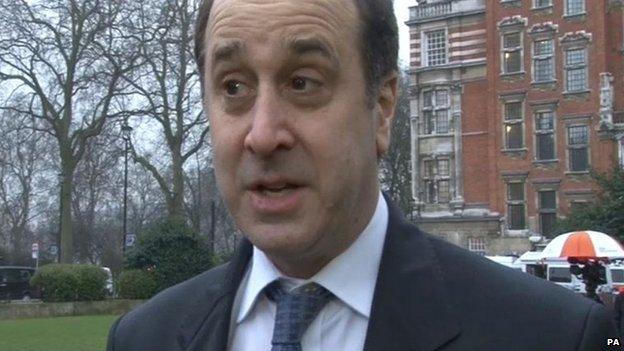Press watchdog Ipso will 'damn' deliberate rule-breakers
- Published

Most newspapers have signed up to Ipso
Newspapers that break press rules "deliberately" or "flagrantly" will be "damned" by the new industry watchdog, its chairman, Sir Alan Moses, has said.
But Sir Alan, the former judge who heads the Independent Press Standards Organisation (Ipso), said papers were unlikely to face exemplary £1m fines.
In a speech to the Society of Editors, he said Ipso would use a "slim, clear book of rules" not an "iron fist".
He insisted he did not want a "boring, defensive" press, but an "unruly" one.
"Mistakes and errors of judgement will always occur," said Sir Alan.
"But if you do so deliberately, flagrantly, without caring one jot whether you break the code or not, Ipso will damn you.
"We want a free, fair and unruly press ruled only by an independent regulator, Ipso, who will support you and encourage you to remain free, fair and unruly."
'Sham'
Most newspapers have signed up to Ipso, which replaced the much criticised Press Complaints Commission in the wake of the Leveson report into press standards.
The Guardian, Independent and Financial Times are three of those that have declined to embrace the new watchdog.
Campaign group Hacked Off, which wants tougher press regulation, has dismissed Ipso as a "sham".
Sir Alan has said Ipso will prove its independence with its actions.

Ipso is investigating a newspaper sting against former Tory minister Brooks Newmark
Referring to the prospect of exemplary fines, Sir Alan said: "When Ipso was launched we were all told how different the regulatory regime would be now that there was power to fine up to £1m or 1% of annual turnover.
"And they said, 'There you are... now you can show your mettle by fining someone £1m, that's what you need.'
"You only have to say that, to see how unlikely it is. Proper successful independent regulation will not be established by manic firing of a big bazooka."
'Public interest'
Sir Alan said Ipso's decisions would occasionally be unpopular.
"But we are not here to be popular. We are not here only to secure agreement but to manage disagreement.
"Of course it is important that there should be urgent and speedy resolution of complaints. Publications should be encouraged to settle disputes, with fairness, clarity and above all without delay."
One of the first tests for the new watchdog is the case of the Conservative former minister, Brooks Newmark, who resigned in September after a newspaper sex sting.
The Sunday Mirror has said its report that Mr Newmark sent explicit pictures of himself to a male undercover journalist claiming to be a woman was in the public interest but critics have questioned the paper's methods.
Ipso has said it is continuing to investigate although a complaint against the newspaper has since been dropped - the first time a British press regulator has pursued a case in the absence of a complainant.
- Published8 September 2014

- Published24 June 2014

- Published30 October 2013
